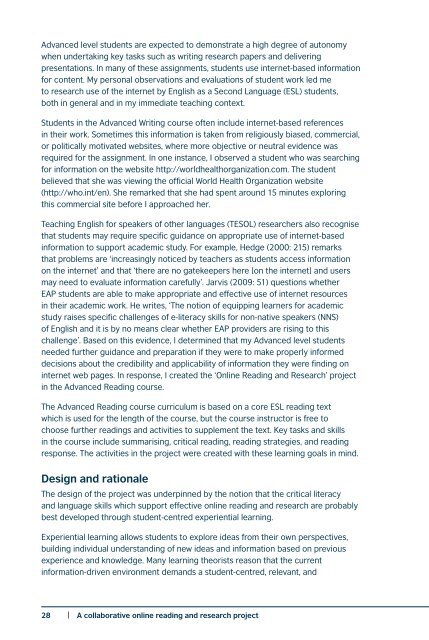Here - EnglishAgenda - British Council
Here - EnglishAgenda - British Council
Here - EnglishAgenda - British Council
You also want an ePaper? Increase the reach of your titles
YUMPU automatically turns print PDFs into web optimized ePapers that Google loves.
Advanced level students are expected to demonstrate a high degree of autonomywhen undertaking key tasks such as writing research papers and deliveringpresentations. In many of these assignments, students use internet-based informationfor content. My personal observations and evaluations of student work led meto research use of the internet by English as a Second Language (ESL) students,both in general and in my immediate teaching context.Students in the Advanced Writing course often include internet-based referencesin their work. Sometimes this information is taken from religiously biased, commercial,or politically motivated websites, where more objective or neutral evidence wasrequired for the assignment. In one instance, I observed a student who was searchingfor information on the website http://worldhealthorganization.com. The studentbelieved that she was viewing the official World Health Organization website(http://who.int/en). She remarked that she had spent around 15 minutes exploringthis commercial site before I approached her.Teaching English for speakers of other languages (TESOL) researchers also recognisethat students may require specific guidance on appropriate use of internet-basedinformation to support academic study. For example, Hedge (2000: 215) remarksthat problems are ‘increasingly noticed by teachers as students access informationon the internet’ and that ‘there are no gatekeepers here [on the internet] and usersmay need to evaluate information carefully’. Jarvis (2009: 51) questions whetherEAP students are able to make appropriate and effective use of internet resourcesin their academic work. He writes, ‘The notion of equipping learners for academicstudy raises specific challenges of e-literacy skills for non-native speakers (NNS)of English and it is by no means clear whether EAP providers are rising to thischallenge’. Based on this evidence, I determined that my Advanced level studentsneeded further guidance and preparation if they were to make properly informeddecisions about the credibility and applicability of information they were finding oninternet web pages. In response, I created the ‘Online Reading and Research’ projectin the Advanced Reading course.The Advanced Reading course curriculum is based on a core ESL reading textwhich is used for the length of the course, but the course instructor is free tochoose further readings and activities to supplement the text. Key tasks and skillsin the course include summarising, critical reading, reading strategies, and readingresponse. The activities in the project were created with these learning goals in mind.Design and rationaleThe design of the project was underpinned by the notion that the critical literacyand language skills which support effective online reading and research are probablybest developed through student-centred experiential learning.Experiential learning allows students to explore ideas from their own perspectives,building individual understanding of new ideas and information based on previousexperience and knowledge. Many learning theorists reason that the currentinformation-driven environment demands a student-centred, relevant, and28 | A collaborative online reading and research project

















